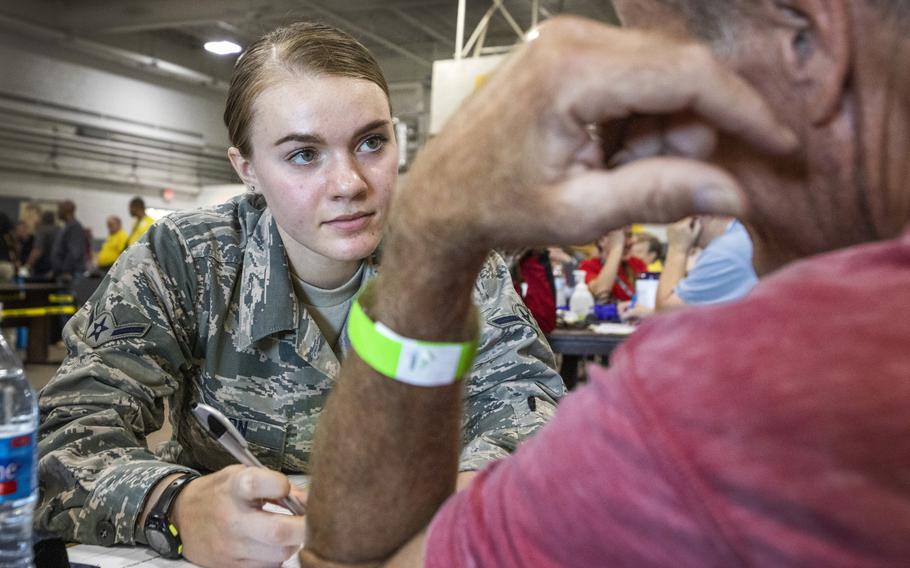
U.S. Air Force Airman Hannah E. Uron, Aerospace Medical Technician, 177th Fighter Wing, New Jersey Air National Guard, performs a health assessment on a homeless veteran during the Sgt. 1st Class Robert H. Yancey Sr. Stand Down at the National Guard Armory in Cherry Hill, N.J., Sept. 27, 2019. (Mark Olsen/New Jersey National Guard)
Another patrol on the road to Kandahar in Afghanistan. Routine, but not routine — could there ever be a routine for travel in an area so dangerous?
And then it happened — an IED, an explosion. Somehow, he was blown out of the vehicle, injured but not dead. But he was conscious and in those moments he could only watch as his sergeant, who had been his mentor and his friend, burned to death. He was trapped and couldn’t get out. Two other soldiers with them were nowhere to be seen. He later learned they had also died. He was the only survivor. The screams haunted him. Why hadn’t he been the one to die? It should have been him.
He was medevaced back to the mainland where he recovered for months. Then he was discharged and after another six months of rehab at the Department of Veterans Affairs hospital in Washington, D.C., he returned to his home in rural California.
Like for so many of our veterans, there was no easy access to ongoing services that he needed for the worsening post-traumatic stress disorder he was experiencing, the guilt, the depression. He felt alienated from family and friends. He found the only thing to relieve his emotional pain was overusing the opioid pain medications he’d been given since his injury and during rehab, but which had been cut off on his retirement.
He discovered fentanyl. And the rush of relief that each injection gave him. But this just pushed him further away from family and friends — and really, he thought, that’s what he wanted anyway. He went into the hill country, where he lived in a tent by himself. He was close enough to town to get his drugs and pick up his disability checks, but far enough away that no one bothered him.
To him, it seemed like the right place for someone with his past. And the VA health services were too far away for him to be able to get there for health care.
The VA works hard to provide the services that veterans need, including health care and housing vouchers. But too many veterans still end up in situations where they find themselves homeless and unable to get essential medical services such as mental health and substance abuse care.
The annual HUD Point in Time survey estimated that there were 35,574 homeless veterans in our country in 2023, with over 15,000 of these being unsheltered homeless. This number represents an increase of 7.4% over the number estimated in 2022. The reach of the Veterans Administration Health System is limited and often veterans in need cannot get to a VA health facility.
How can we meet the needs of these Americans who deserve our gratitude?
One way is by fully implementing the Certified Community Behavioral Health Clinic (CCBHC) program nationally. This $8 billion program funded by Congress in the Bipartisan Safer Communities Act (BSCA) of 2022 put a framework in place to develop and implement an integrated mental health, substance use disorder and physical health care program. Programs offering these services have already been established in many states and over time it is expected that this system will grow and be widespread nationally.
CCBHCs offer 24/7 crisis services, case management, psychiatric rehabilitation services, peer and family support and counseling services, and community-based mental health treatment with an additional mandate to service veterans. The establishment of CCBHCs state by state will bring these essential services to communities both urban and rural throughout the nation.
Further, CCBHCs can help with housing and other social service needs. Partnerships with the departments of Housing and Urban Development, Agriculture, and Justice, as well as the VA, can make housing resources available to veterans and others receiving mental health treatment. Restoration of mental health and recovery from substance abuse disorders makes it possible for those with these serious behavioral health conditions to maintain their housing.
Establishing a widespread integrated health care system that provides easy access to resources will serve those in extraordinary need like our homeless veterans with mental illness. When the needs of the most vulnerable are addressed, we improve the lives of all Americans.
Dr. Elinore McCance-Katz is an Able Americans Senior Fellow. She served as assistant secretary of Health and Human Services for Mental Health and Substance Use from 2017 to 2021.